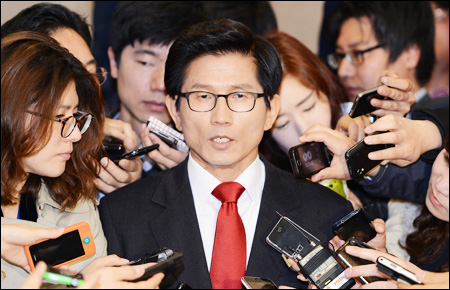Governor declares presidential bid

Gyeonggi Province Governor Kim Moon-soo receives a flurry of questions from reporters after declaring his presidential bid at the National Assembly in Yeouido, Seoul, Sunday.
Gyeonggi Province Governor Kim Moon-soo declared his presidential candidacy Sunday, becoming the first to announce a bid to compete in the ruling Saenuri Party’s presidential primary.
“Today, I announce my decision to run for the presidential election,” he said during a press conference at the National Assembly. Kim said he wants to build a greater future for Korea by narrowing regional, generational and ideological divides, as well as income polarization.
More potential presidential contenders, including former party leader Chung Mong-joon, are expected to follow suit soon as the preliminary registration for presidential hopefuls begins today.
The labor-activist-turned politician emphasized that people should shed the illusion that Park Geun-hye, daughter of the late President Park Chung-hye and head of the governing party’s interim leadership committee, is indisputably the top presidential contender.
“Park Geun-hye has prepared her presidential run for more than 10 years,” he said. “I’ve just made my first move but I’m convinced that I can attract more support than her once the race goes into full force.”
Kim’s support base remains fragile despite his fight for social injustice as a three-term lawmaker from 1996 through 2008 and a two-term governor of the nation’s most populous province.
The 61-year-old has long had a single-digit support rate in previous surveys of potential presidential candidates, trailing behind Park, IT-mogul-turned professor Ahn Cheol-soo and Chung.
His popularity plummeted recently after media reports late last year that two officers of Namyangju Fire Station were transferred to other stations for failing to recognize his voice over the phone.
Asked by The Korea Times about his position on the country’s multicultural policy, the governor underscored the need for the country to urgently address challenges that migrants face due to the language barrier.
“At the core of many problems concerning the multicultural members of our society is language,” he said.
“We need to have a more open mindset toward a wide spectrum of multicultural members of our society and beef up our efforts to provide language education for them.”
He said Korea’s short history of multiculturalism and some of its people’s tendency to prefer a “racially homogeneous” society leaves much work for the next government to do.
He also demanded a revision of the Saenuri Party’s primary rules so that citizens, rather than party members, decide who will run in the presidential race on the conservative party’s ticket.
Chung, an honorary FIFA vice president and the largest shareholder of Hyundai Heavy Industries, is expected to declare his intention to take part in the primary by the end of April. Other potential presidential hopefuls in the ruling bloc, including Lee Jae-oh, a close confidant to President Lee Myung-bak, and former Prime Minister Chung Un-chan are reportedly mulling declaring their presidential ambitions.
Park, widely viewed as one of the most likely contenders to win the next presidential election, has not yet thrown her hat into the ring. The presidential election will be held on Dec. 19 as President Lee Myung-bak’s single five-year term ends in February next year.
Many pundits forecast Kim and other hopefuls have little chance of defeating Park in the primary as she has further cemented her support base with her party’s victory in the April 11 National Assembly elections.
She played a pivotal role in helping the ruling party win a majority in the parliamentary elections though most pundits predicted an easy victory for the main opposition Democratic United Party. <Korea Times/Lee Tae-hoon>





















































